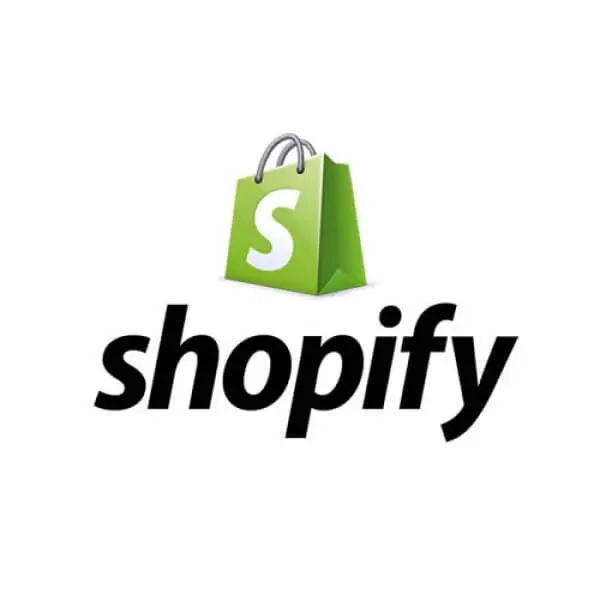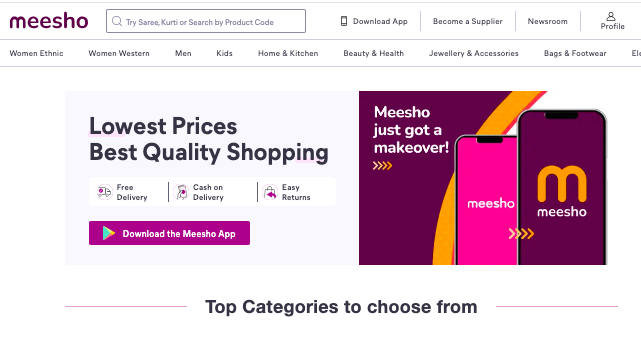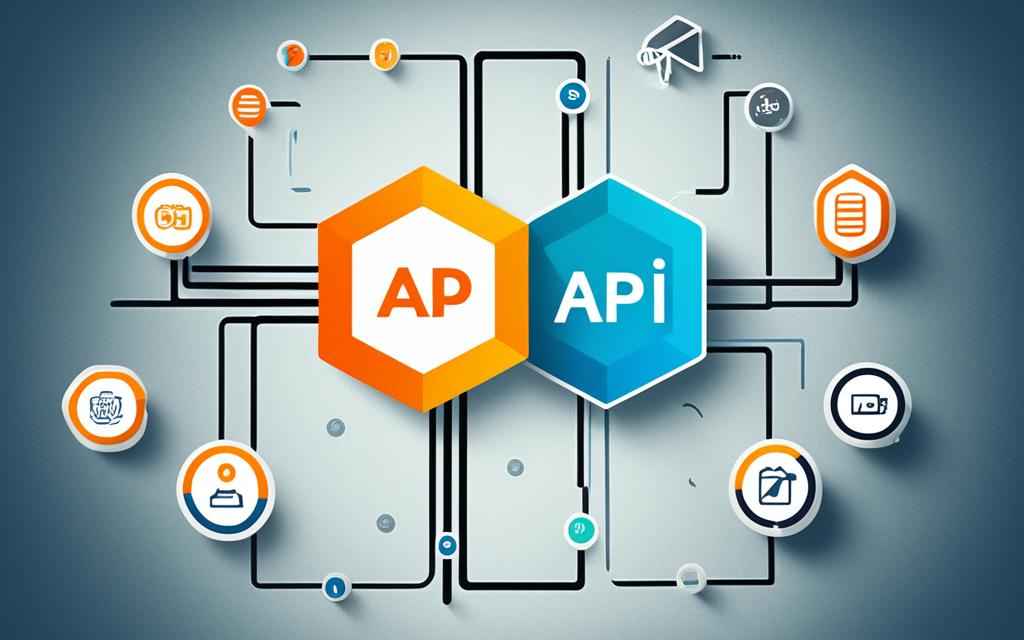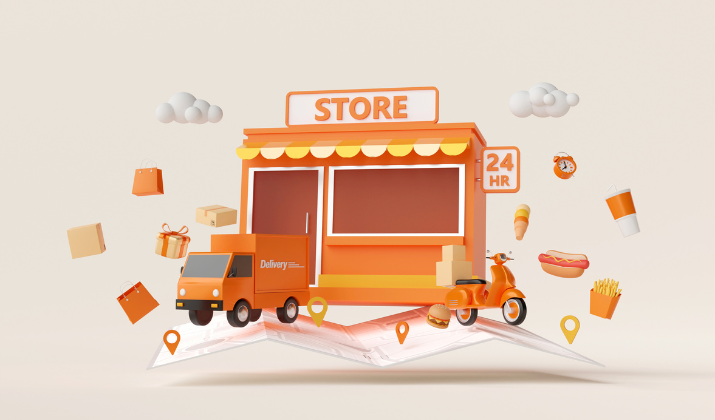Imagine for a moment that you’re Wendy, a small business owner looking to expand your product line into the digital realm.
You’ve heard whispers of Shopify and Meesho, two popular ecommerce platforms that have been making waves in the industry.
As you delve deeper into the options, you can’t help but wonder: which one is the perfect fit for your growing online store?
With the myriad of ecommerce platforms available, the choices can seem overwhelming.
That’s where our comprehensive comparison of Shopify and Meesho comes in – to help you navigate the ecommerce landscape and make an informed decision that aligns with your business goals.
Whether you’re a small-to-mid-sized business or an enterprise-level company, this comparison will provide the insights you need to navigate the two platforms.
Let’s learn more.
Check Out: Shopify vs Printify
What is Shopify?
Shopify is a leading ecommerce platform that empowers businesses of all sizes to create and manage their online stores.
With its robust features, the platform offers merchants a wide range of capabilities, including customizable templates, seamless payment processing, advanced inventory management, and a vast ecosystem of integrations.
Shopify’s comprehensive feature set is designed to help you establish and grow your online presence.
From customizable store templates and intuitive content management tools to powerful inventory tracking and secure payment gateways, Shopify provides the essentials you need to build and manage a successful ecommerce business.
Shopify’s target market encompasses a diverse range of businesses, catering primarily to small and medium-sized enterprises, as well as larger, enterprise-level companies.
Regardless of your company’s size, Shopify offers the resources and support to help you navigate the ever-evolving ecommerce landscape and achieve your online sales goals.
Shopify’s pricing structure is designed to be flexible and accessible, with plans starting at $29 per month. As your business grows, you can upgrade to higher-tier plans that unlock additional features and functionality.
The platform also offers a free trial and first month for just $1 for those just starting their ecommerce journey.
Try Shopify free followed by first month at just $1. No credit card required. Limited Time Offer.
What is Meesho?
Meesho is a unique social commerce platform that connects suppliers with individual resellers, creating a dynamic marketplace model.
The Meesho platform empowers users to easily list and sell a wide range of long-tail products, leveraging the company’s extensive supplier network.
This digital ecosystem allows merchants and ecommerce businesses to source products, list them for sale, and manage their operations all in one place.
By tapping into Meesho’s vast supplier network, users can access a diverse range of long-tail products, catering to niche consumer demands and expanding their product offerings.
Meesho’s target audience consists of two key groups: merchants and ecommerce businesses seeking a marketplace to run and grow their operations, as well as buyers looking to optimize their resale activities and enhance the customer experience.
In other words, it also does dropshipping by allowing customers to buy and then resell products to other customers.
Meesho doesn’t have any subscriptions plans or take any commissions from the sellers. It makes money by charging resellers or customers against Shipping.
Key Differences
While both Shopify and Meesho operate in the ecommerce space, there are several distinct differences between these two platforms that are worth exploring.
Understanding the unique features and capabilities of each platform can help you determine which one aligns better with your business needs and goals.
Platform Type: Hosted vs Marketplace
One of the primary distinctions between Shopify and Meesho is the underlying platform structure.
Shopify is a hosted platform, where users can build and manage their own online store, complete with customization options and a range of features.
In contrast, Meesho is a marketplace platform that connects suppliers with individual resellers, facilitating a unique ecommerce model.
Customization and Flexibility
When it comes to customization and flexibility, Shopify offers a distinct advantage over Meesho.
Shopify’s extensive ecosystem of apps and integrations allows businesses to tailor their online presence with a wide range of additional features and functionalities.
The level of customization provides greater flexibility for merchants to create a truly unique and branded ecommerce experience.
Explore: Printful vs Shopify
Try Shopify free followed by first month at just $1. No credit card required. Limited Time Offer.
Ease of Use & Setup
In terms of ease of use and setup, Meesho’s well-defined marketplace structure may be simpler to navigate for some merchants, especially those new to ecommerce.
Shopify, on the other hand, offers a broader range of features and customization options, which may require a steeper learning curve for some users.
However, Shopify’s comprehensive documentation and support resources can help businesses overcome this initial setup challenge.
Supported Platforms & Devices
When it comes to ecommerce platform support, both Shopify and Meesho offer extensive compatibility with a wide range of platforms and devices.
This cross-device accessibility ensures that your business can reach customers across multiple channels, providing a seamless shopping experience no matter the device they’re using.
Shopify supports a variety of operating systems, including Windows, macOS, iOS, Android, and Chromebook. This means that you can manage your Shopify-powered online store from virtually any device, whether you’re on the go or at your desktop.
Shopify’s platform support allows you to stay connected and in control of your business, no matter where you are.
Similarly, Meesho is also compatible with Windows, macOS, iOS, Android, and Chromebook devices.
The versatility allows Meesho users, including merchants and resellers, to access the platform and conduct their business operations seamlessly across different platforms and devices.
Whether you’re managing your product listings, processing orders, or engaging with your customers, Meesho’s device support ensures a consistent and efficient experience.
Also Read: Is Ecwid Safe?
Integration & APIs
Both Shopify and Meesho offer extensive ecommerce platform integrations, allowing merchants to extend the functionality of their online stores and streamline their business operations.
Shopify provides merchants with access to a vast ecosystem of third-party apps and Shopify APIs, covering a wide range of functionalities, from marketing and analytics to shipping and accounting.
Similarly, Meesho APIs enable businesses to connect with various external systems and tools to enhance their operations, such as inventory management, order fulfillment, and customer relationship management.
The integration capability empowers merchants to create a seamless and efficient ecommerce experience for their customers across multiple platforms and systems.
By leveraging the extensive integration options offered by both Shopify and Meesho, merchants can streamline their workflows, improve data management, and ultimately deliver a more compelling and personalized experience for their customers.
Try Shopify free followed by first month at just $1. No credit card required. Limited Time Offer.
Customer Support & Resources
Both Shopify and Meesho recognize the importance of providing merchants with the assistance and information they need to succeed.
Support Channels
Shopify and Meesho offer multiple support channels to address your ecommerce platform customer support needs.
You can access phone support, 24/7 live chat, and extensive online documentation to find the answers and guidance you require.
Whether you need help troubleshooting an issue or seeking advice on best practices, these ecommerce platform support channels are designed to ensure you receive timely and effective assistance.
Try Shopify free followed by first month at just $1. No credit card required. Limited Time Offer.
Training & Documentation
In addition to their support channels, Shopify and Meesho also provide a wealth of training resources and documentation to help you maximize the capabilities of their respective platforms.
From webinars and live online sessions to in-person training opportunities, both platforms offer comprehensive ecommerce platform training resources to ensure you can navigate their features, optimize your online store, and drive success for your business.
Also Read: Ecwid Review
Choosing the Right Platform for Your Business
Both Shopify and Meesho offer viable ecommerce platforms for merchants and businesses seeking to establish and grow their online presence.
Shopify’s robust feature set, extensive customization options, and enterprise-level support make it a compelling choice for businesses that desire full control over their online store.
Whereas Meesho’s marketplace model and shipping-based pricing structure may appeal to merchants looking to leverage an established platform with a built-in customer base.
Ultimately, the decision between Shopify and Meesho will depend on your specific business requirements, target audience, and the level of control and flexibility you require from your ecommerce platform.
By carefully considering factors such as platform type, customization capabilities, ease of use, integration options, customer support, and pricing structures, you can make an informed decision that aligns with your business goals and objectives.














